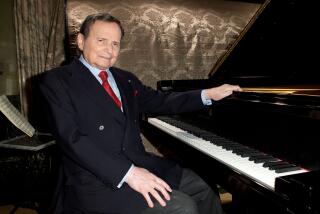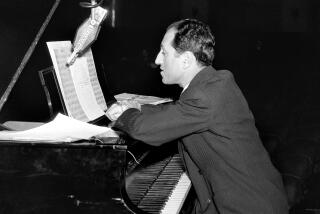Van Alexander dies at 100, big band leader and Ella Fitzgerald composer
When he was young, Van Alexander knew that he wanted to have a life in music. What he didn’t know was that his long list of future musical achievements would be ignited by a children’s song that he arranged and co-wrote with singer Ella Fitzgerald.
The 1938 jazz-tinged recording of “A Tisket-A Tasket,” sung by Fitzgerald with the Chick Webb Orchestra, became one of the classics of the Swing Era, propelling Alexander into a high-soaring career that reached across the musical spectrum. He was a band leader, a composer and a prolific music arranger in Hollywood for television and film.
Alexander, who continued to compose and arrange television and film scores well into his 90s, died Sunday of natural causes at Cedars-Sinai Medical Center, his daughter Joyce Harris said. He was 100.
Alexander was “central to the development of the Swing Era, and so much of what followed,” jazz critic Garry Giddins said.
Although, in his later years, he did not continue the high-intensity work schedule he kept most of his life, Alexander continued to be a musical advisor and teacher to young composers and arrangers who sought out his creative guidance.
During a 100th birthday celebration in May at Catalina Bar & Grill in Hollywood, composer-arranger Johnny Mandel recalled studying with Alexander as a young musician.
“He threw me in the water and yelled ‘swim,’“ Mandel said. “If it wasn’t for Van, I don’t know what I’d be doing.”
Born Alexander Van Vliet Feldman on May 2, 1915, he grew up in New York City. His father was a pharmacist, his mother a classical pianist who gave him piano lessons from the age of six.
Although his mother trained him classically, Alexander -- like many young people who grew up in the Roaring ‘20s and the Prohibition era that followed -- was attracted to jazz and the rapidly expanding big band music of the Swing era. Living in Harlem, he was exposed to the great black bands of the era at dance halls such as the Savoy Ballroom.
In high school, he began to write arrangements for his own group – the Al Feldman Band – using his birth name, while he took theory and orchestration classes at Columbia.
It was at the Savoy that Alexander, still a teenager, met drummer and big jazz bandleader Chick Webb, who gave him the opportunity to write his first arrangements.
“Chick liked what I did with the songs,” Alexander told Marc Myers of Jazz Wax, a leading jazz blog. “He paid me $10 for each one, and I went home on Cloud 9. I had sold my first arrangement, and I was 19 years old.”
By the mid-’30s, he was arranging for Webb’s band on a regular basis. After Webb died in 1939, Alexander was asked by RCA Victor Records to start his own band. But Eli Oberstein, then head of RCA, wasn’t certain Alexander’s birth name would work as a label for a new big band.
“He asked me to change my name so it would be more dramatic,” Alexander told Myers. “Mr. Oberstein asked me my middle name. I told him. He said I should use it as my first name and Alexander as my last. So I did.”
He stuck with Alexander for the rest of his long-running career, as an arranger and, increasingly, as a composer for films and television.
His television credits included “Dennis The Menace,” “The Brady Bunch,” “I Dream of Jeannie” and “Bewitched.” He arranged and conducted variety shows featuring Dean Martin, Mickey Rooney, Gordon McRae, Jimmy Stewart and others. And in film, he was favored for his ability to create richly atmospheric music deemed necessary for film noir titles like “Big Operator,” “Baby Face Nelson,” “I Saw What You Did” and “The Private Lives of Adam and Eve.”
Alexander chronicled his life in “From Harlem to Hollywood: My Life In Music” and wrote “First Arrangement,” a textbook on film music arrangement widely used in collegiate scoring classes in the 1950s. It was followed by “First Chart: A New Method to Teach Arranging to Today’s Contemporary Musicians.”
Alexander’s honors included Grammy and Emmy awards and a Lifetime Achievement Award from ASCAP. But the stellar turn-out for his 100th birthday celebration highlighted the honor in which he was cheered by hundreds of his contemporaries.
“I’ve really been blessed and I don’t take anything for granted.” Alexander said. “I never touched a cigarette, a drink or a woman... until I was 11 years old.”
Then he grew serious. “This has been a night to savor. I’ve had so much fun, I’m going to try for 101!”
Alexander’s wife of 72 years, Beth, died. In addition to his daughter Joyce, he is survived by daughter Lynn Tobias, four grandchildren and 14 great-grandchildren.
News.obits@latimes.com
Don Heckman is a former jazz critic for the Los Angeles Times.
More to Read
Start your day right
Sign up for Essential California for the L.A. Times biggest news, features and recommendations in your inbox six days a week.
You may occasionally receive promotional content from the Los Angeles Times.






